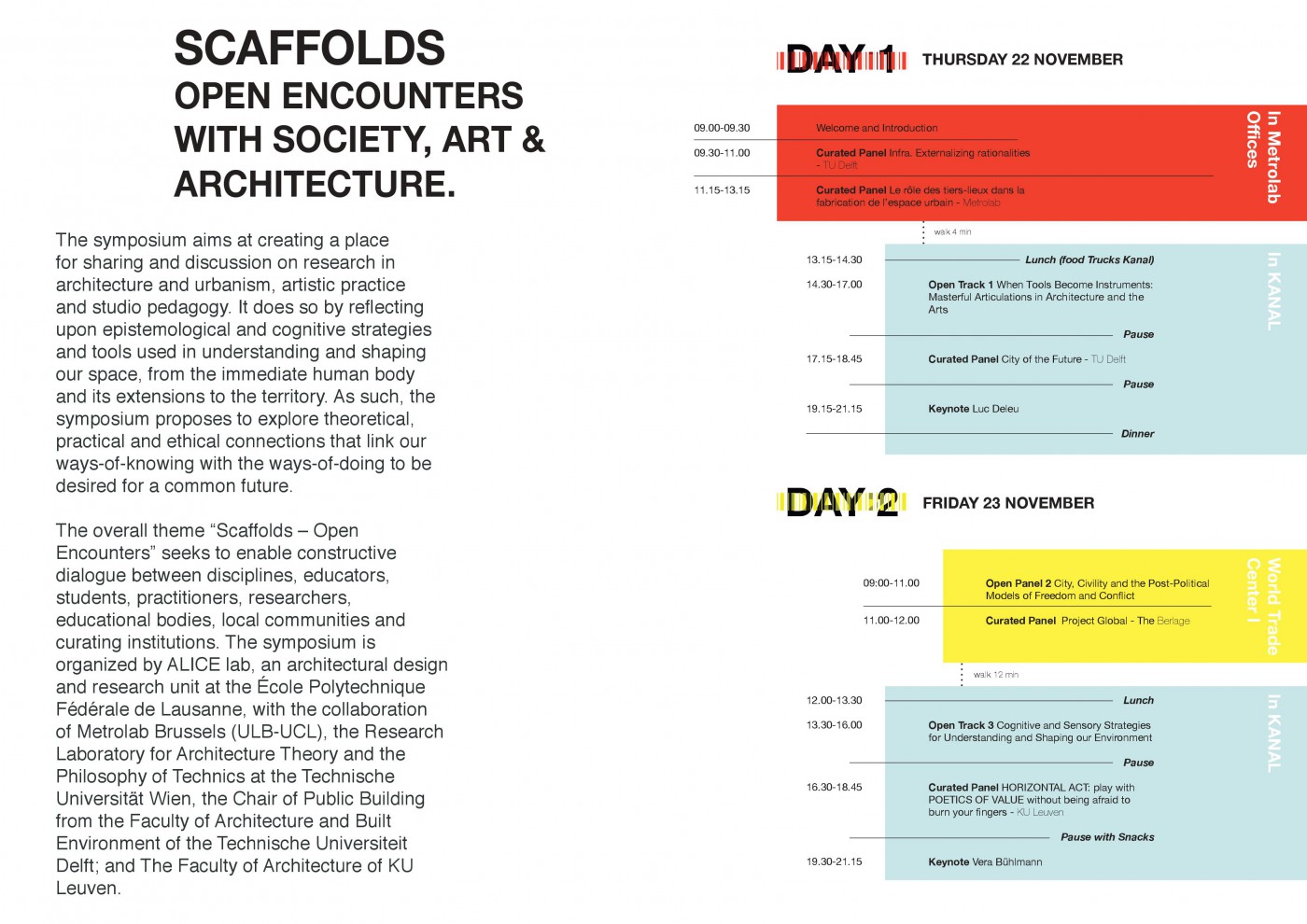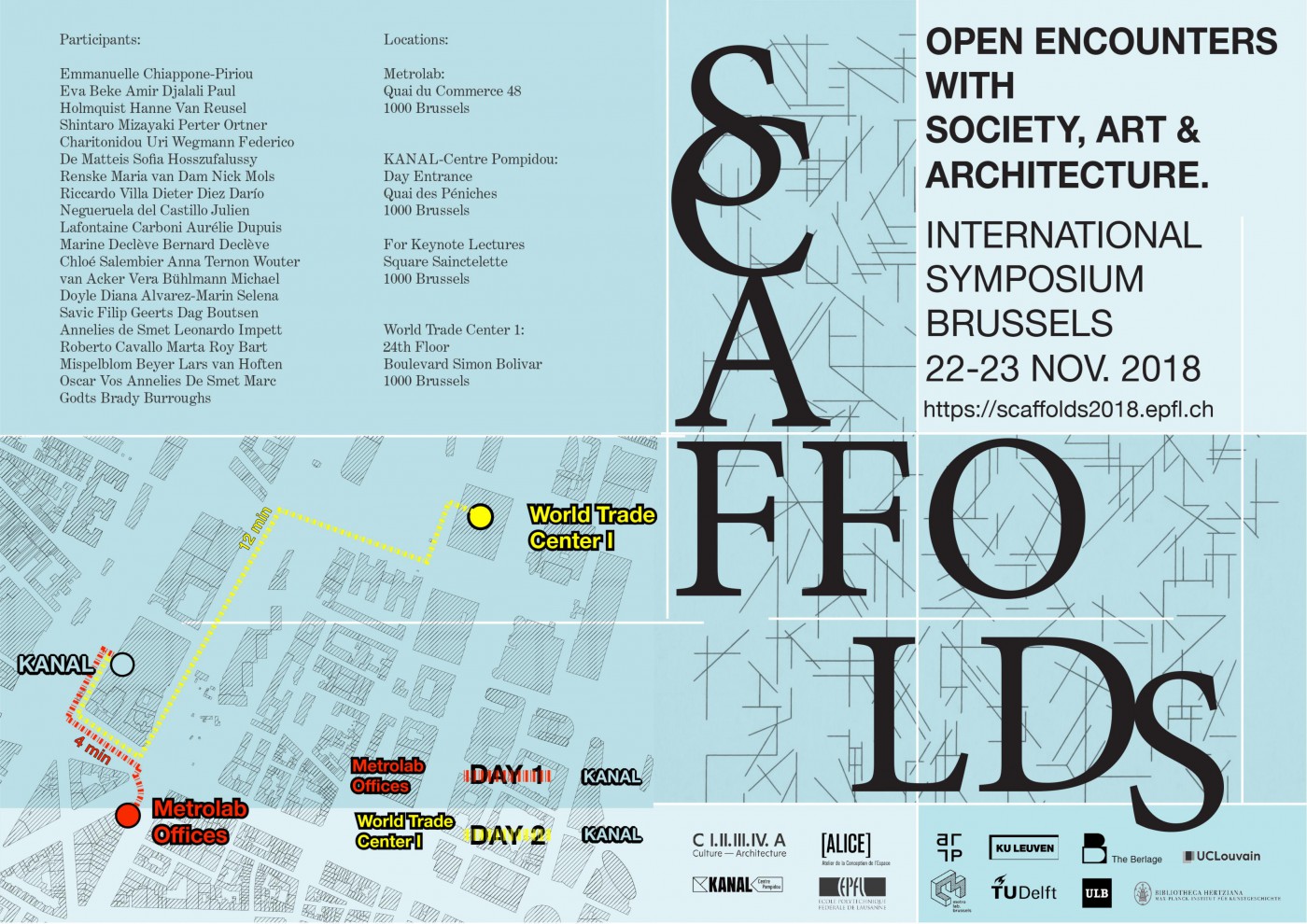The 22nd of November Metrolab Studio will host a round table named "The role of third-places in the making of public spaces". This event is organised in the framework of the international symposium "Scaffolds – Open Encounters with Society, Art and architecture" that will take place from 22nd to 23rd of November 2018 in different places in Brussels. To know more check out the programme and the EPFL website.
The whole symposium is organised by ALICE lab EPFL, in collaboration with Metrolab Brussels (ULB-UCL), ATTP Technische Universität Wien, the Faculty of Architecture and Built Environment of the Technische Universiteit Delft; and The Faculty of Architecture of KU Leuven.
The role of third-places in the making of public spaces
from 11:15 to 13:15 at Metrolab Studio (Quai du Commerce 48 – 1000 Brussels). Bilingual FR-EN
The sharing of space has always been an issue in the making of the city. The choice of separating the functions (working, living, moving, entertaining) or their combination in a single place is one of the central variables of the urban project. The recent proliferation of coworking spaces, fablabs, and temporary occupations through cultural or artistic activities brings new light to this debate. Neither completely public nor completely private, these are intermediate spaces that we call third places. These third places have the particularity of being collective spaces that favour individuation. They contribute to the development of artistic practices that can as well have an impact on the public space and the conviviality that settles there. The round table will question both the shared dimension of third places and the impact that activities developed there have on the public space. We consider three axes of thinking: the creation of places, the artistic and cultural trajectories, the urban design. The discussion will focus on the interventions of Pierre Pevée (SMart) on the Brussels Art Factory in Saint-Gilles and LaVallée in Molenbeek, Stéphane Damsin (Recyclart) on the reopening of the Recyclart art center on Manchester street and Petra Pferdmenges (Alive Architecture) on the Packdesign 2014 project, Parkfarm.
SPEAKERS
-
Pierre Pevée is the manager of LaVallée, a creative third place developed by SMart and launched in September 2014. On any given day, any of over 150 creative entrepreneurs can be found at this converted laundrette in Molenbeek, where they interact, exhibit and create in residence. Pierre is also the creator of the Brussels Art Factory, the artistic director of leftorium (a nightlife concept in Brussels) and a DJ in his spare time.
-
Stéphane Damsin is an architect. He founded in 2009 the Brussels based office Ouest, that he in the meantime runs with partner Jan Haerens. Ouest focuses on topics and projects around architecture, culture and society; ranging from built works to research and curatorial programs. Stéphane Damsin is in charge of architecture and city programs at the Brussels art center Recyclart. Created in 1997 in the Chappelle station, Recyclart is a unique arts centre in Brussels. It is a place for artistic creation, social economy and urban debates that connects art with the urban context in which it is rooted. The closure of Recyclart from Chappelle station and its recent re-opening in Manchester street brings out the issue of how to re-create the magic of the place in another neighborhood.
-
Dr. Petra Pferdmenges is an architect. She founded the spatial agency Alive Architecture that curated the design biennale Parckdesign 2014: Parkfarm in collaboration with Taktyk. This edition of Parckdesign took place within the first phase of the parc Tour&Taxis and was foreseen to stay for 5 months. The project Parkfarm aimed at co-creating an edible park with a social and ecological purpose in order to propose the re-appropriation of the public green space by the inhabitants. Thanks to the success of the project - judged by the citizens - the project expanded from ephemeral to durational and became officially recognized as a permanent urban project that is still active today.
The round table will be introduced by Marine Declève (urbanist and art historian, PhD student Metrolab Brussels) and Anna Ternon (architect and urbanist, PhD student Metrolab Brussels), moderated by Chloé Salembier (anthropologist, LOCI-UCLouvain) and discussed by Bernard Declève (ir. architect and urbanist, Metrolab Brussels LOCI-UCLouvain). All four are associated to a collective research on the possibility for the commons, as spaces, collective subjects and action systems, to contribute to the recomposition of territorial structures.
PROGRAMME
11h15: Introduction by Marine Declève and Anna Ternon
11h30: Recyclart by Stéphane Damsin
11h45: BAF and LaVallée by Pierre Pevée
12h00: Parkfarm by Petra Pferdmenges
12h15: Collective discussion moderated by Chloé Salembier
13h00: Conclusion by Bernard Declève
This round table is organised by:
- Marine Declève: m.decleve@metrolab.brussels
- Darío Negueruela: dario.negueruela@epfl.ch


